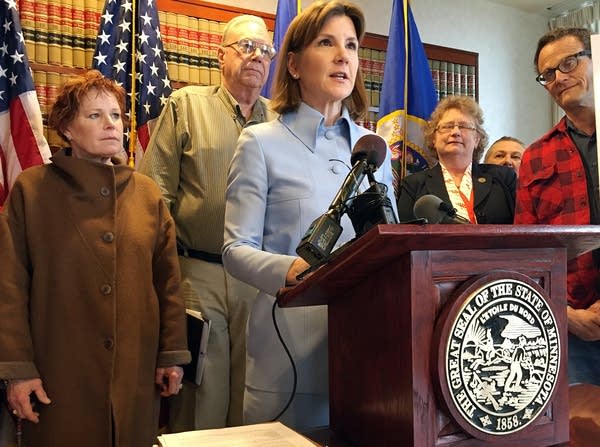Attorney general: Landline deregulation would raise prices, cut service

Go Deeper.
Create an account or log in to save stories.
Like this?
Thanks for liking this story! We have added it to a list of your favorite stories.
A proposal that would change how local phone companies are regulated at the Minnesota State Capitol is facing opposition amidst concerns that it would lead to higher prices and less service in rural areas.
The bill's advocates say less regulation would allow them to stay competitive with newer technologies.
Attorney General Lori Swanson said the proposal that's being pushed by telecommunication companies would "eviscerate" 100 years of state law protecting consumers, including a requirement that phone companies provide access in far-flung rural areas.
"We're very concerned that they'll just drop people who are too expensive to serve," Swanson said. "And we're very concerned that if they don't drop you, they'll say, 'Great, it will be $250 a month.'"
Turn Up Your Support
MPR News helps you turn down the noise and build shared understanding. Turn up your support for this public resource and keep trusted journalism accessible to all.
The bills are opposed by former Minnesota Attorney General Skip Humphrey and Mike Hatch, who called it a "metro-centric" bill that would hurt the elderly and the poor.
Minnesota Telecom Alliance President Brent Christensen said he views the proposal more as re-regulation than deregulation. The bills would change the threshold under which landline phone companies are required to provide service and remove some price caps.
"That would allow incumbent carriers to be regulated the same as their competitors if they pass a competitive test," Christensen said. "It's a really, really small step."
But Swanson said the threshold under which phone companies could ask for a change in their regulation status was broad enough that it would include more than 90 percent of phone companies in the state. She said it would allow companies to claim that internet and cell phones qualify as competition for landlines.
"Landline is a very unique product market, it's an exclusive product market, it's one that you can't fill in the gap with a cellphone or a computer," Swanson said. "Try emailing 911 if you're having a heart attack."
Federal Communications Commission figures show that the number of landlines in the United States decreased by half between 2006 and 2013. Christensen said landline carriers are already regulated by a number of state agencies and the FCC. He said the proposal would allow companies struggling with consumers who are unplugging to compete on more equal footing with newer technologies.
"Landline service as a standalone service is going away," Christensen said. "Consumers are making the change, we're just trying to get regulations that fall in line with that."
CenturyLink, a large landline provider in the state that has supported the bills at the Capitol, filed a request last year asking the Public Utilities Commission to grant a waiver to a requirement that landline companies service to out-of-service phone lines within 24 hours about 95 percent of the time.
"Imposing an expensive and outdated service quality metric is unnecessary," according to the waiver request. "This petition carries little risk for the customer. If CenturyLink provides service customers consider inadequate, they will move to a competitor. The market, and not government rules and regulations, should dictate how providers behave."
Other states have already deregulated phone companies. Swanson said her office has found that some of those states, like California, have seen an increase in prices.
"Since California eliminated price regulations, prices have gone up 150 percent," Swanson said. "This is not something the public wants, it's something that companies want."
The Minnesota chapter of the AARP also opposes the bill. Sandi Hagglund, from Stearns County, said she used her landline to call 911 while caring for her husband during a long illness, including one time that he had very low oxygen levels.
"Because my home is surrounded by trees and hills, the cell reception there is limited, sometimes non-existent," Hagglund said. "If I had to drive that ten minutes to get cell phone reception, my husband would have died."
Versions of the bipartisan bill have already received first hearings in both the state Senate and the House. Neither of the bills' main authors, Sen. Dan Sparks, DFL-Austin, nor Rep. Ron Kresha, R-Little Falls, immediately responded to a request for comment.


